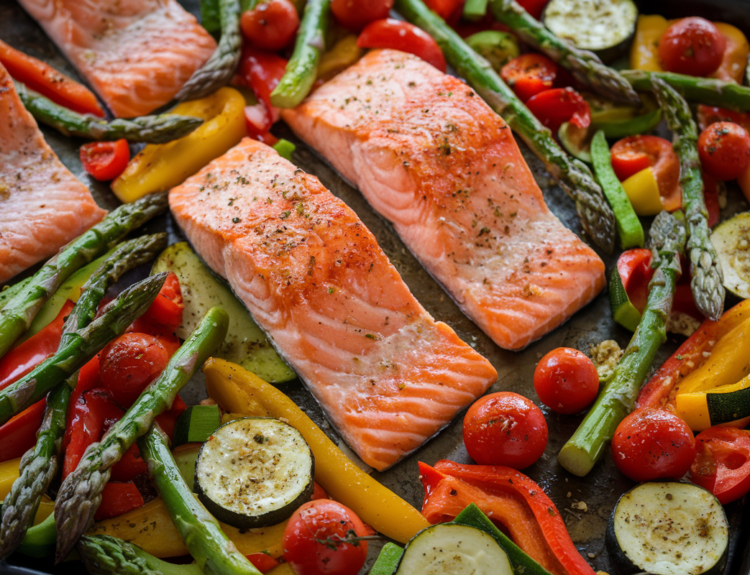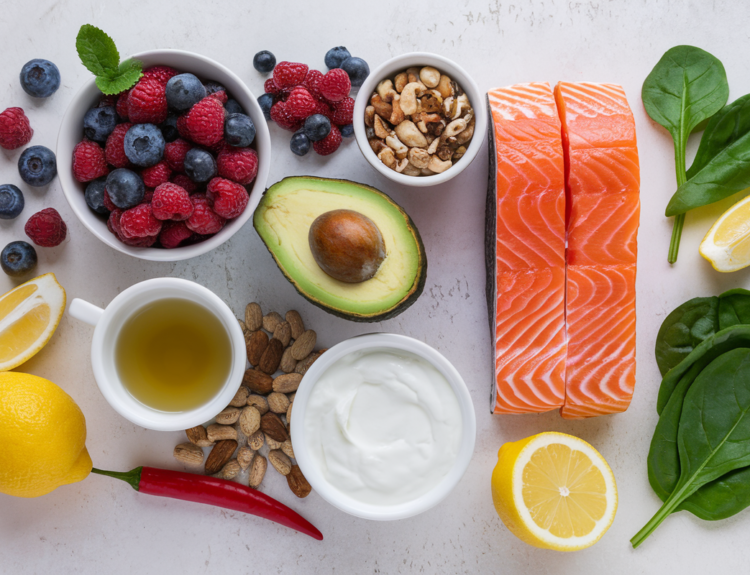This guide unravels the calories in one egg and the distinctions between the nutrient-packed egg white and the energy-dense yolk. Whether you’re on a weight loss journey or simply aiming for a healthier lifestyle, understanding the role of eggs in your diet is vital. Join us as we navigate egg nutrition, providing insights into their impact on weight management and offering delectable, low-calorie recipes that make eggs a flavorful and health-conscious choice.
Explore calories in one egg, comparing white and yolk for weight loss. Gain insights into egg nutrition and enjoy low-calorie recipes for a healthy, flavorful diet.
In this article:
- Calories in one egg: Nutritional breakdown
- Calories in one egg white
- Calories in one egg yolk
- White vs. yolk for weight loss
- Low-calorie egg recipes
CALORIES IN ONE EGG: NUTRITIONAL BREAKDOWN
Eggs encompass a spectrum of essential elements, each contributing to our overall well-being. The caloric composition of an egg varies based on its size. See the table below for more details.
| Egg Size (United States) | Mass per Egg | Calories in One Egg (Approx.) |
| Jumbo | 70.9 g | 110 kcal |
| Very Large (XL) | 63.8 g | 99 kcal |
| Large (L) | 56.8 g | 88 kcal |
| Medium (M) | 49.6 g | 77 kcal |
| Small (S) | 42.5 g | 66 kcal |
| Peewee | 35.4 g | 55 kcal |
Beyond caloric considerations, eggs are nutritional powerhouses. They offer a rich blend of vitamins such as B6, B12, and D and essential minerals like iron and zinc. The egg white, comprising proteins and amino acids, supports muscle health, while the yolk, often unfairly criticized, houses valuable fat-soluble vitamins (A, D, E, and K) and choline, crucial for brain health.
The caloric content of eggs may vary slightly depending on preparation methods. While the intrinsic nutritional value remains consistent, adding fats or oils during cooking, as is common in scrambled eggs, can impact the overall caloric intake. Boiled and poached eggs, cooked without added fats, may have a lower calorie count. However, these differences are relatively minor and don’t significantly alter the nutrient profile of the egg itself.
This nutritional breakdown serves as a foundational guide, and in the following, you can read more about the distinction between egg white and egg yolk.
CALORIES IN ONE EGG WHITE
Egg whites contain 52 calories (216 kJ) per 100-gram serving, making them a stellar choice for those who prioritize weight management or seek a guilt-free protein source. The protein content is notable at 10.9 grams per 100 grams, positioning egg whites as an excellent source of amino acids crucial for muscle repair and overall bodily function.
What makes egg whites particularly appealing is their lean profile. With only 0.17 grams of total lipids, they align with dietary preferences, emphasizing low-fat options. Beyond their caloric modesty, egg whites bring an array of essential vitamins and minerals. From calcium for bone health to selenium as a potent antioxidant, egg whites contribute significantly to overall well-being.
Vitamins like riboflavin (B2), niacin (B3), vitamin B-6, folate, and vitamin B-12 further enhance the nutrient profile. These vitamins play pivotal roles in energy metabolism, red blood cell formation, and the overall maintenance of good health.
Versatility is the cherry on top of the egg white package. Whether folded into a morning omelet, whipped into a post-workout smoothie, or used in various culinary creations, egg whites are a blank canvas, effortlessly absorbing flavors.
Whether you’re an athlete, a calorie-conscious individual, or someone who values health and taste, egg whites deserve a prominent place on your plate. Make them a dietary staple and relish the nutritional excellence they bring to your table daily.
CALORIES IN ONE EGG YOLK
With their rich and velvety texture, egg yolks pack a substantial energy punch, containing 322 calories (1350 kJ) per 100 grams.
While egg yolks are higher in calories than egg whites, they offer essential nutrients. Their noteworthy protein content of 15.9 grams per 100 grams makes them a valuable source of amino acids crucial for various bodily functions. Their fat content, at 26.5 grams per 100 grams, is higher but includes a mix of saturated, monounsaturated, and polyunsaturated fats.
Egg yolks also boast an impressive array of vitamins and minerals, like calcium for bone health, iron for oxygen transport, and selenium for its antioxidant properties. Additionally, they are a powerhouse of B vitamins, including thiamin, riboflavin, niacin, and vitamin B-12, contributing to energy metabolism and overall well-being.
While egg yolks are a nutrient-dense food, some individuals avoid them due to concerns about weight gain. The truth is that when consumed in moderation as part of a balanced diet, egg yolks can be a valuable and healthy component. Research suggests that the cholesterol content in eggs if consumed in moderation, has a limited impact on blood cholesterol levels for most people.
WHITE VS. YOLK FOR WEIGHT LOSS
When considering the calories in one egg and their role in weight loss, it’s crucial to align dietary choices with established guidelines for a healthy diet. According to these guidelines, a typical individual can enjoy one egg daily without significantly impacting blood cholesterol levels or elevating the risk of heart disease. Some sources, including a dietitian in the video above, suggest that healthy individuals may consider including up to three whole eggs daily.
Understanding the nutritional disparities between egg whites and yolks is pivotal for those concentrating on weight management. The low-calorie, high-protein composition of egg whites makes them an excellent choice for weight loss enthusiasts. On the other hand, the egg yolk, with its higher calorie and fat content, provides a rich array of essential nutrients.
Individuals mindful of weight loss should note that egg whites and yolks can be part of a health-conscious diet when consumed in moderation. Whether opting for the protein-packed egg whites or choosing the whole egg, incorporating eggs allows for a flexible and enjoyable approach to weight management.
For advice tailored to your specific health conditions and concerns, it’s advisable to consult with a healthcare professional.
LOW-CALORIE EGG RECIPES
Since we have determined the number of calories in one egg and that eggs can be our allies in losing weight, here are some delicious recipes that you should try:
- Vegetable Omelette Muffins: Whisk together eggs and pour them into muffin tins. Dice vegetables such as bell peppers, spinach, and tomatoes and add them to the eggs. These omelet muffins are perfect for a quick, low-calorie breakfast.
- Egg White and Veggie Scramble: Cook a mix of egg whites and toss in your favorite veggies like mushrooms, onions, and zucchini—season with herbs and spices for flavor without extra calories.
- Spinach and Feta Egg Wrap: Scramble eggs with fresh spinach, fold them into a whole-grain wrap, and sprinkle with feta cheese for flavor.
- Avocado and Egg Salad: Combine hard-boiled eggs with diced avocado, cherry tomatoes, and arugula. Toss with a light vinaigrette for a satisfying and low-calorie salad.
- Sweet Potato and Egg Hash: Dice sweet potatoes and sauté until tender. Add eggs and cook—season with herbs and spices at the end for a flavorful and filling hash.
- Egg and Veggie Stuffed Bell Peppers: Cut bell peppers in half. Remove seeds, and fill each half with scrambled eggs, diced veggies, and low-fat cheese. Bake until the peppers are tender.
- Egg White Banana Pancakes: Blend egg whites with ripe bananas to create a simple, low-calorie pancake batter. Cook them on a pan and serve with fresh fruit for a guilt-free breakfast.
_____
Our exploration of the calories in one egg shows that eggs can be valuable allies in weight management. Experiment with the diverse, low-calorie recipes provided, embracing the versatility of eggs for a delicious journey toward a healthier lifestyle.









